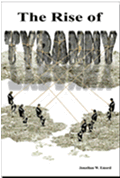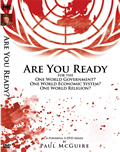AMERICA'S
SHIP OF STATE
PART 2
By Dr. Carl Parnell,
Ed.,D
December 22, 2012
NewsWithViews.com
In America’s Ship of State (Part I), George Washington’s perspective for keeping America’s Ship of State strong and safe was discussed. In America’s Ship of State (Part II), the discussion of George Washington’s perspective for America remaining strong and safe continues with points four through six.
Fourth, does America still exhibit the proper virtues of republican people? In some respects, based on the definition of “the virtues of republicanism,” which occurs when people give up their own interests for the common good, America does still have the virtues of republicanism in operation in the nation. According to John Adams, George Washington’s vice-president and the second President of the United States,
There must be a positive Passion for the public good, the public Interest, Honor, Power, and Glory, established in the Minds of the People, or there can be no Republican Government, nor any real Liberty. And this public Passion must be Superior to all private Passions. Men must be ready, they must pride themselves, and be happy to sacrifice their private Pleasures, Passions, and Interests, nay their private Friendships and dearest connections, when they Stand in Competition with the Rights of society.
However, since America is rapidly turning into a government-supported welfare state and the fact that America has already become a materialistic nation, there probably are fewer people than ever that would give up their own interests for the public good. As a result, if liberty is to prevail, a renewal of the proper virtues of republicanism must begin as soon as possible. According to Bernard Bailyn, an American historian, author, and professor specializing in U.S. Colonial and Revolutionary-era History, “The preservation of liberty rested on the ability of the people to maintain effective checks on wielders of power and hence in the last analysis rested on the vigilance and moral stamina of the people . . . Virtuous citizens needed to be strong defenders of liberty and challenge the corruption and greed in government.” But, since too many Americans are looking for a government handout and/or obtaining materialistic possessions, they are not concerned about corruption and greed in government as long as it does not interfere with their own personal corruption and greed. Therefore, Commander George Washington, the first Commander of America’s Ship of State, would roll over in his grave if he knew that American people and those who represent them were losing the proper virtues of republicanism, which was responsible for making the United States a nation whose freedoms and liberties far surpass any other nation.
Fifth, does America still have the need for morality and religious principle as a popular spring of popular government? According to the Federal government today, America does not need morality and religious principle as a popular spring of popular government, especially since it is controlled by secular humanists, those who believe man can be ethical and moral without God or religion. As a result, secular humanist liberals have been trying to eliminate Christianity and anything associated with morals from the public sector. This can be seen vividly in the agenda of the liberal Democratic Party as it promotes immoral behavior and anti-Christian propaganda. Also, President Obama seemingly enjoys proclaiming regularly that America does not have a Judeo-Christian heritage, despite the fact that scriptures are found encrypted on many federal buildings and many quotes by the Founding Fathers make reference to God and/or Jesus Christ. But, if the secular humanists are going to achieve their main objective to turn America into an atheist nation that operates without morals or religious principles, they must first convince Americans and their representatives that morality and religious principles were never used in the propagation of a popular government.
However, Commander Washington saw it much differently when he controlled the wheel of America’s Ship of State. He said:
Of all the dispositions and habits which lead to political prosperity, religion and morality are indispensable supports. In vain would that man claim the tribute of patriotism who should labor to subvert these great pillars of human happiness, these firmest props of the duties of man and citizens. The mere politician, equally with the pious man, ought to respect and to cherish them. A volume could not trace all their connexions with private and public felicity. Let it simply be asked, Where is the security for property, for reputation, for life, if the sense of religious obligation desert the oaths, which are the instruments of investigation in Courts of Justice?
And let us with caution indulge the supposition that morality can be maintained without religion. Whatever may be conceded to the influence of refined education on minds of peculiar structure, reason and experience both forbid us to expect that national morality can prevail in exclusion of religious principle. It is substantially true, that virtue or morality is a necessary spring of popular government. The rule, indeed, extends with more or less force to every species of free government. Who, that is a sincere friend to it, can look with indifference upon attempts to shake the foundation of the fabric?
Of course, based on Commander Washington’s direct quote, he firmly believed that morality and religious principles were “necessary and proper” if the government of the United States was to survive its shaky beginnings until the present. As he stated, religion and morality were needed if America wanted to be a prosperous nation politically, socially, and economically. In fact, he believed that anyone who attempted to remove these two pillars of human happiness from America should not claim to be a true patriot. True politicians should support these two pillars of human happiness, too. In essence, George Washington believed that without morality and religious principles America’s masterful government would not achieve the objectives of the Founding Fathers, which was to create a nation whose government would provide its citizens with unlimited freedoms and liberties. Therefore, Commander George Washington, the first Commander of America’s Ship of State, would roll over in his grave if he knew that morality and religious principles had been removed from the cornerstone of America’s foundation.
Finally, does America still have the prohibition on entering permanent, long-term entangling alliances with foreign nations? Unfortunately, America does not have the prohibition on entering permanent, long-term entangling alliances with foreign nations. However, America did not heed the warning delivered by George Washington in his Farewell Address in 1796. He purported that America should not get involved with binding agreements with other nations. He said,
...a passionate attachment of one nation for another produces a variety of evils. Sympathy for the favorite nation, facilitating the illusion of an imaginary common interest in cases where no real common interest exists, and infusing into one the enmities of the other, betrays the former into a participation in the quarrels and wars of the latter without adequate inducement or justification. It leads also to concessions to the favorite nation of privileges denied to others, which is apt doubly to injure the nation making the concessions by unnecessarily parting with what ought to have been retained, and by exciting jealousy, ill will, and a deposition to retaliate in the parties from whom equal privileges are withheld.
Washington, also said,
The great rule of conduct for us, in regard to foreign nations, is in extending our commercial relations to have with them as little political connection as possible. So far as we have already formed engagements, let them be fulfilled with perfect good faith. Here let us stop.
But, since America did not follow George Washington’s advice, it has created many problems for its military and its economy. As a result, many Americans have lost their lives and billions, if not trillions, of dollars have been spent on protecting those nations that America is bound to protect based on a signed entangling treaty between two or more foreign nations. Entangling alliances causes “choppy” waves for the Ship of State.
Of course, George Washington was not the only Founding Father who spoke out against “entangling alliances.” In fact, some of his friends, John Adams and Thomas Jefferson, also spoke out against them. John Adams said,
America goes not abroad in search of monsters to destroy. She is the well-wisher to the freedom and independence of all. She is the champion and vindicator only of her own.... She well knows that by once enlisting under other banners than her own, were they even the banners of foreign independence, she would involve herself beyond the power of extrication in all the wars of interest and intrigue, of individual avarice, envy and ambition, which assume the colors and usurp the standards of freedom.
Thomas Jefferson said,
I am for free commerce with all nations, political connection with none, and little or no diplomatic establishment. And I am not for linking ourselves by new treaties with the quarrels of Europe, entering that field of slaughter to preserve their balance, or joining in the confederacy of Kings to war against the principles of liberty.
Also, Thomas Jefferson said,
I have ever deemed it fundamental for the United States never to take active part in the quarrels of Europe. Their political interests are entirely distinct from ours. Their mutual jealousies, their balance of power, their complicated alliances, their forms and principles of government, are all foreign to us. They are nations of eternal war. All their energies are expended in the destruction of the labor, property and lives of their people.
Finally, Thomas Jefferson said,
Peace, commerce and honest friendship with all nations — entangling alliances with none, I deem [one of] the essential principles of our government, and consequently [one of] those which ought to shape its administration.
Ultimately, based on these quotes made by George Washington, John Adams, and Thomas Jefferson, America should not have signed treaties with other nations that required it to enter into permanent, long-term entangling alliances. Therefore, Commander George Washington, the first Commander of America’s Ship of State, would roll over in his grave if he knew that the United States had agreed many times over to get involved with the political and military affairs of other nations around the world.
| Subscribe to the NewsWithViews Daily News Alerts! |
In review, George Washington was the first commander of America’s Ship of State and he is viewed by many Americans as the greatest. He was a statesman who had the interest of the nation at heart more so than his own personal interests and personal agendas. Of course, the main thing that made him such a great commander was his belief in the U.S. Constitution as the rule of law, the virtues of a united people, and the moral values and religious principles of its citizens. As a result, despite the many uncertainties and rough political waves that America’s Ship of State encountered in the early days of its existence, it still remained afloat and completed its eight-year maiden voyage successfully. Therefore, Commander George Washington left an honorable political legacy to all Americans.
Click here for part -----> 1, 2,
© 2012 Dr. Carl Parnell - All Rights Reserved
Carl Parnell retired from public school teaching in 1999. He taught history and other social science courses for over forty years. He taught middle school, high school, and college level. Carl was a Lead Teacher and Principal of the On-Campus School at Georgia Baptist Children’s Home in central Georgia. Presently, he's teaching at a private, Christian high school.
Carl served in the United States Army from 1968-1971. He also served in the United States Air Force Reserves from 1983-1986, was chosen Teacher of the Year in 1991. Carl was included in the 1993, 1994 and 2007 editions of Who’s Who Among America’s Teachers. He was selected Star Teacher at hes present school in 2007 and published his first book, "From Schoolhouse to Courthouse: Exposing America’s New Terror from Within" (ISBN: 1-58736-613-4) in July 2006.
Carl has completed his second book, which is in an eBook format, entitled "A Brewing Pot of Christian Persecution: America's Postmodern Anti-Christian Crusade." My eBook, as well as over 60 of my articles, can be viewed at FaithWriters. Com
Website: drcarlsterlingparnell.wiki.zoho.com
E-Mail: drcarlparnell@faithwriters.net











 Share
This Article
Share
This Article






